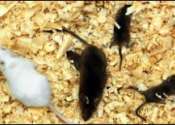Common gene known to cause inherited autism now linked to specific behaviors
(Medical Xpress)—The genetic malady known as Fragile X syndrome is the most common cause of inherited autism and intellectual disability. Brain scientists know the gene defect that causes the syndrome and understand the ...
Jun 4, 2013
2
0








